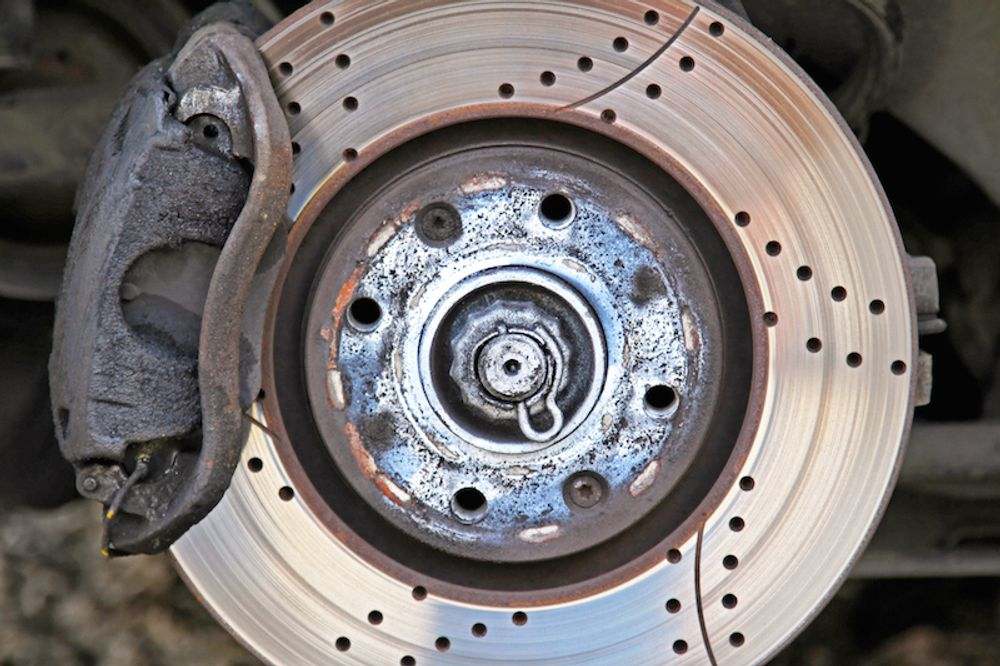How to Tell if You Have Pads and Rotors or Shoes and Drums
Vehicles on the road today can have two different types of braking systems, known as “disc brakes” and “drum brakes.” Each wheel on your vehicle has its own brake, and virtually all modern cars have disc brakes in front. Disc brakes are more expensive, and offer superior performance where it’s needed, given 70-80% of your vehicle’s braking force comes from the front brakes. That’s why front brakes typically need to be replaced before rear brakes.
Occasionally, the rear brakes have drum-brake systems. For example, an entry-level Toyota Corolla (Base MSRP $18,500) comes stock with rear drum brakes, but the pricier entry-level Toyota Camry LE (Base MSRP $23,070) comes stock with rear disc brakes.
Drum Brakes vs. Disc Brakes – The Basics
How Drum Brakes Work
Drum brakes use a part called a drum to cover the braking components inside. Instead of having brake pads, the system uses brake shoes. When you press on your brake pedal, the shoes press outwards against the inside of the drum, causing the car to stop.
Why are drum brakes still used today? Rear drum brakes keep your overall vehicle costs down by not using the more expensive disc brake setup in front. The drum brake setup can also act as an emergency brake. Most cars require an additional brake setup to act as an emergency brake when using disc brakes, which further adds to the cost of a vehicle with disc brakes.
How Disc Brakes Work
Disc brakes use a part called a rotor, a flat, round metal plate (like a pizza). The rotor has a larger metal bracket-like piece on top, called the caliper. The caliper holds the brake pads on each side of the rotor. When you press down on the brake pedal, the caliper acts like a hand, squeezing the pads against the spinning rotor, causing the car to stop.
One of the main benefits to having disc brakes is that the disc is exposed to air, so it cools faster, and allows for better braking performance. Some newer cars, especially expensive sports cars, come with the option to get colored calipers like red, yellow, blue or black.
Drum Brakes vs. Disc Brakes – Replacement (aka a “Brake Job”)
Drum Brakes
If you have rear drums, typically the shoes are replaced, while the drum is just resurfaced. On the other hand, there are more moving parts to drum brakes. So, it’s possible for the replacement cost to go up closer to that of disc brakes.
Disc Brakes
For a vehicle with disc brakes, a “complete brake job” means replacing pads and rotors on the front or rear of the vehicle. Some believe rotors don’t always need to be replaced, and can just be resurfaced or “machined.” Installing only new pads, and not pads and rotors, may increase your stopping distance. Our best advice is to have the rotors inspected by a quality technician, who will advise you on the best course of action.
Risks of Only Resurfacing Rotors
Vehicle manufacturers do not recommend resurfacing rotors. Some say that replacing only the pads runs the risk of brake material noise because you now have brand new pads (cheap or premium) barking against a rotor that is already worn. Back in the day rotors were thicker, and there was plenty of material available to resurface. These days, rotors are usually thinner and weigh significantly less, which is good for fuel economy! In turn, it makes the rotors “one time use”.
Drum Brakes vs. Disc Brakes – Cost Estimates
Because the front brakes on virtually all cars are disc brakes, we’ll give estimates only for rear brakes, in order to demonstrate the cost difference. These prices assume a $100 of labor, and aftermarket parts. The time the job takes varies, but it’s usually approximately 1-2 hours of work.
- 2006 Toyota Camry LE 4-Cylinder Rear Disc Brake Job: $329.77
- 2006 Toyota Corolla LE 4-Cylinder Rear Drum Brake Job: $339.93
For more specific costs on brake replacement jobs near you, request an estimate from Openbay.
Remember!
Your vehicle’s brakes are among the most important operating systems – next to tires and your seat belts – to ensure your safety. If you feel any symptoms of faulty brakes, make sure you get to a shop ASAP. And, be sure the technician performing your brake job is using the correct components and certified to be working on your car.
Save upwards of 25% on
car repair and maintenance services with Openbay+

